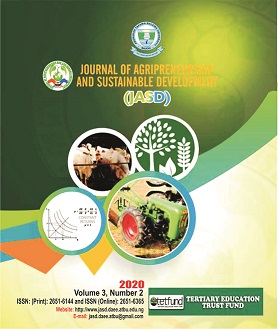EFFECTS OF DESCRIPTIVE NORMS, PERCEIVED ECONOMIC VIABILITY AND BEHAVIOURAL INTENTION ON LIVESTOCK AGRIPRENEURSHIP AMONG AGRICULTURAL COLLEGE STUDENTS IN NIGER STATE, NIGERIA
DOI:
https://doi.org/10.59331/jasd.v3i2.112Keywords:
Agripreneurship, Behavioural Intention, College Students, Descriptive Norms, Perceived Economic ViabilityAbstract
Agripreneurship is a means of eradicating poverty among Nigerian youths. The study examined the effects of descriptive norms, perceived economic viability and behavioural intention on livestock agripreneurship among agricultural college students in Niger State, Nigeria. Multi-stage sampling technique was used to select 432 respondents across three agricultural colleges in Niger State, Nigeria. Data were analyzed using descriptive and inferential statistics (linear regression) at P≤0.05. Results showed that the respondents were male (63.2%), not married (87.5%), were of good standing in their class performance with a cumulative grade point average of ≥2.5 (59.7%) and below 26 years old (84.7%) with a mean age of approximately 23 years. The most descriptive norm of livestock agripreneurship by respondents was the popularity of poultry production (x̅ = 3.85). The most perceived economic viability of livestock agripreneurship by respondents was the gainful employment in fish production business (x̅ =3.97). The most behavioural intention of respondents in livestock agripreneurship was to make a career out of poultry production (x̅ =3.81). Linear regression revealed that descriptive norms (β0.203) and perceived economic viability (β = 0.247) were significant factors that influenced the respondents’ behavioural intention. The study concluded that descriptive norms and perceived economic viability are major determinants of the behavioural intention of agricultural college students in livestock agripreneurship in the study area. It was recommended that agripreneurship norms, its economic viability and the behavioural intention towards it could be enhanced through the youth engagement programmes, better enabling environment, agripreneurship awareness and promotions.
Downloads

Downloads
Published
How to Cite
Issue
Section
License
Copyright (c) 2022 Journal of Agripreneurship and Sustainable Development

This work is licensed under a Creative Commons Attribution 4.0 International License.






